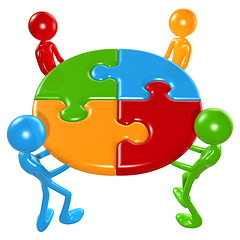|
Teamwork In The WorkplaceThe Wisdom Of TeamsTeamwork in the workplace is an integral aspect of change management. In this site we identify and explore all of the key themes that dimensions that are essential for a successful change initiative. And our definition of success is a situation where all of the envisaged benefits are actually realised. A team can loosely be defined as a group of people working together towards the achievement of a shared and common goal. In a change management context it is not enough for the team to simply deliver, install or implement a new capability.
The shared and common goal is the full realisation of the organisational benefits of the change.
The foundation of all truly effective teamwork in the workplace is collaboration. The guiding motivation for this collaboration is usually thought of as the sum of the parts transcending the individual efforts of the whole. Thus the synergy generated by teamwork in the workplace outperforms any realistic performance expectation of the individual members of the team. Put simply, one plus one equals more than two.
What makes a good team?The implication of a group of people working together in this way is that there is a recognised interdependence and this is supported by mutual support and co-operation. However this does not happen by default, it is the result of a and this in turn is the result of inspired motivational leadership . The starting point of the change management training that is integral to every aspect of this site is leadership - and a leadership that recognises and directly addresses the emotional dimension. Facilitative Leadership This style of leadership is facilitative leadership and this is all about creating the environment where people want to participate and wnat to collaborate. All too often, in my experience, people do not feel any sense of ownership or responsibility for an outcome. This is always a reflection and consequence of the style of leadership and management that they have experienced - which is usually "centralised-command-control". i.e. "I tell you and you do it!". Over the years, I have so often heard senior management saying variations of this: "But how can I get them to share ownership of decisions and the outcomes – what do I have to do to get them to follow through on their commitments?"
In summary, successful facilitative leadership cultivates truly effective teamwork in the workplace. This teamwork delivers the realised benefits of organisational change.
Teamwork in the workplace is based on the outcome of two key leadership themes: (1) Harnessing the emotional energy of the group As an organisational leader - or a manager in a situation requiring leadership skills - you needs to be transformative and inspirational. It really is up to you to exercise emotional intelligence, build connection with your people and to harness the emotional energy of the group – so that feel the possibilities of belonging and cooperating together as a group for the greater good of the group. (2) Personalise and "emotionalise" the energy for change People need to know cognitively why the change is so important (vision, strategy, business case etc) but they also need to feel emotionally what it will mean to them personally. They need to feel the personal impact of the change. The more they feel it the more they will prioritise it - because it matters to them personally. In my experience, facilitative leadership is essential for effective teamwork in the workplace.
Team building skills - the qualities of a facilitative leaderFacilitative leaders:
Explore in more depth: Facilitative Leadership
Team building strategies + team building techniquesResources Here are several excellent resources which provide practical tools and further "food for thought" on some of the wider nuances of team building strategies and team building techniques: Building Teamwork - Workbook - James H. Saylor People Development and Teamwork - DTI (UK Govt) Employee Work Passion - Blanchard Organisation
The Wisdom Of TeamsIn my view, here is one of the most stimulating and pragmatic resources from Jon R. Katzenbach & Douglas K. Smith ( Harvard Business School Press, 1993) Here is an extract: "Lessons we have learned # Significant performance challenges energize teams regardless of where they are in an organization. # No team arises without a performance challenge that is meaningful to those involved. # A common set of demanding performance goals that a group considers important to achieve will lead, most of the time, to both performance and team. # Performance, however, is the primary objective while a team remains the means, not the end." Courtesy of: "High Performance Teams" - The Wisdom of Teams (extract summary) Critical Note re The Wisdom of Teams - MBA Lausanne - Human Resource Management Course Return from "Teamwork In The Workplace" to: "Starting the change management process"
|





